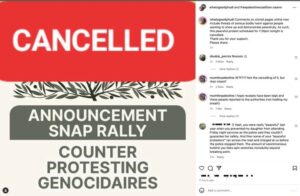I’m writing this late on my Monday evening because I was so worried about what was happening in my hometown. Not where I live now (Canberra) but where my family has lived since 1858. Outside a synagogue not at all far from my own childhood one, and half a suburb away from where my mother lives, there was going to be a pro-Palestine demonstration. Given what happened in Montreal over the weekend, I did not like this at all. Given what happened a few minutes away last year, during a Friday service on the anniversary of Kristallnacht, where my mother’s first cousin was one of the people ‘evacuated’ into a violent anti-Jewish crowd… I was very worried.
I’ve just seen the video clips of what transpired and Australia can sometimes be quite uniquely itself. Before I saw the video clips, however, I realised the angry crowd might be a bit smaller than last time. This notice was circulated on the interwebz shortly before the event: 
Protesters still came. They were thoroughly covered, except for their eyes, and while this might have been sensible to hide their identities, it wasn’t such a good idea. Melbourne was not as hot as Canberra today, but Canberra was in the thirties… so these poor blokes must have been seriously uncomfortable.
I saw a bunch of clips of what happened after they arrived and there was no violence. Two of the pro-Palestine protesters were gently ushered into a police van and I’m pretty sure I heard someone say “Have a good day.” The angry violent Jews shouted “Go home. Leave us alone” in unison. well away from where the protesters stood. I interpreted this (since I come from that community, I trust my interpretation) as “You’ve driven half an hour or an hour to be a pain, now just turn around and drive back, please.” They waved Israeli flags and Australian flags. They sang Hatikvah (mostly off-key) and several of them used the great Australian salute to the group of protesters.
No-one was hurt. Everyone got their point across, including the police. The worst loss was to the dignity of those who were scared of the young woman who led the “Go home” shout.
I wish more protests were like this.
